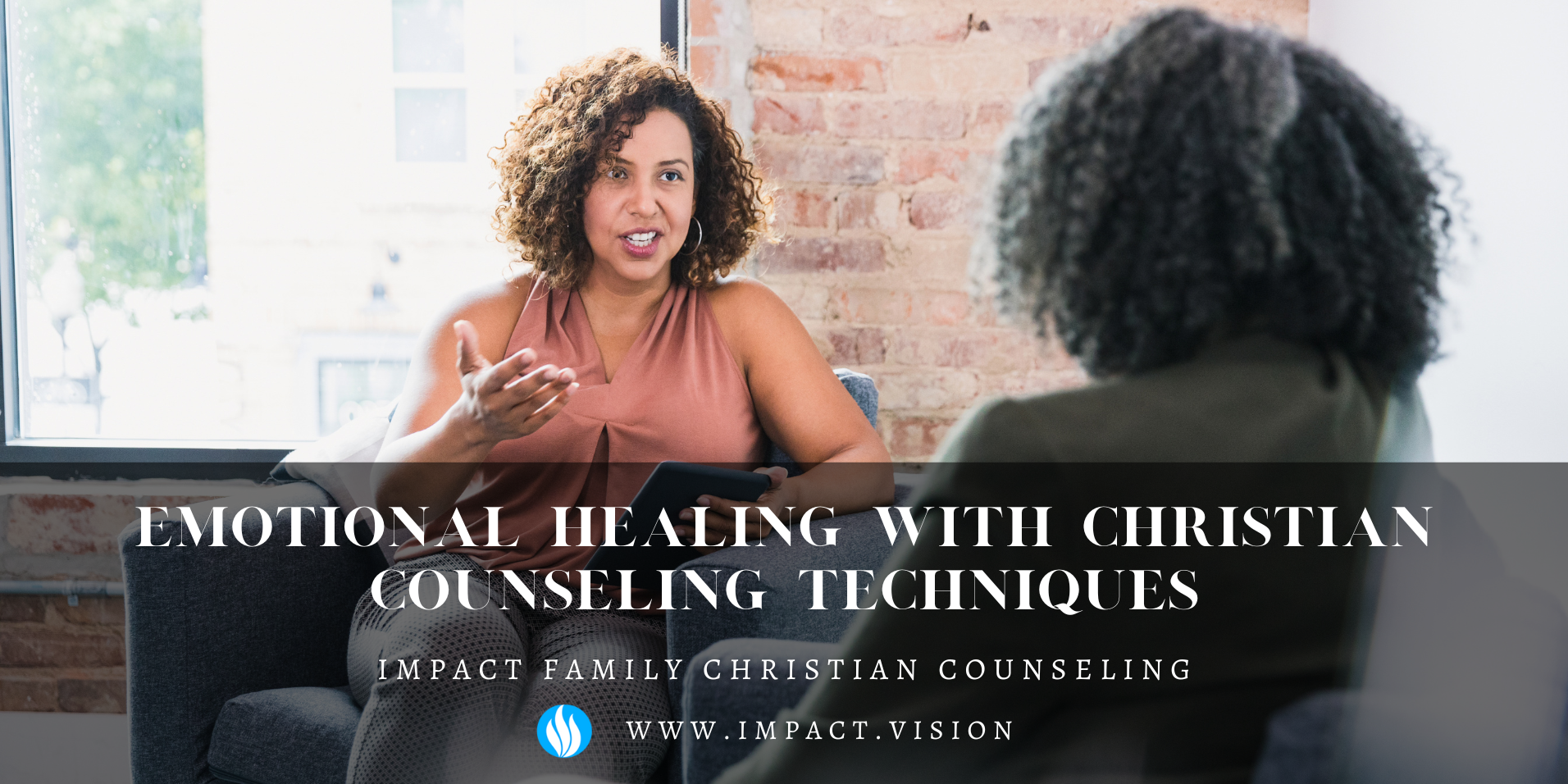In this article, we will explore the powerful and transformative world of Christian counseling techniques. As compassionate Christian counselors, we believe that blending faith-based principles with therapeutic approaches can lead to profound and holistic emotional healing. By delving into the origins, foundations, and biblical underpinnings of Christian counseling, we will uncover how this unique approach can help individuals find meaning, purpose, and lasting personal growth. Get ready to discover the life-changing impact of integrating your spiritual beliefs and practices into the counseling process.
Key Takeaways
- Christian counseling techniques blend faith-based principles with therapeutic approaches for holistic healing.
- Exploring the origins and biblical foundations of Christian counseling can deepen our understanding of this transformative approach.
- Integrating spiritual beliefs and practices into the counseling process can lead to profound personal growth and meaning.
- Christian counselors prioritize the role of faith in emotional healing and personal transformation.
- Discovering the life-changing impact of Christian counseling can inspire us to consider how to incorporate our faith into our own journey of healing.
Understanding Christian Counseling Techniques
At the core of Christian counseling lies the deep-rooted belief that faith and spirituality are integral to the healing and growth of the individual. This unique approach to counseling finds its origins in the timeless teachings of the Bible and the fundamental principles of Christianity. By exploring the historical development and biblical foundations of Christian counseling, we can gain a richer understanding of how this transformative practice seamlessly integrates spiritual beliefs and practices into the counseling process.
Origins and Foundations of Christian Counseling
The origins of Christian counseling can be traced back to the influential works of early pioneers in the field, such as Christian psychologists and theologians. These individuals recognized the profound impact that faith and spirituality can have on an individual’s emotional, mental, and relational well-being. By drawing upon the wisdom and guidance found in the scriptures, they began to develop a specialized approach to counseling that blended biblical principles with traditional therapeutic techniques.
Biblical Principles in Christian Counseling
At the heart of Christian counseling lie the core tenets and principles derived from the Bible. These include the belief in the inherent dignity and worth of each individual, the power of forgiveness and redemption, the importance of personal growth and transformation, and the healing and restorative properties of a strong relationship with God. By integrating these biblical principles into the counseling process, Christian counselors are able to provide their clients with a holistic and spiritually-enriching experience that can lead to profound and lasting change.
As we delve deeper into the world of Christian counseling techniques, we will explore how these foundational elements of faith and spirituality are woven seamlessly into the practice, guiding individuals on a transformative journey of emotional healing, personal growth, and a strengthened connection with the divine.
The Role of Faith in Emotional Healing
At the very heart of Christian counseling lies the profound belief that faith and spirituality are essential components of emotional healing and personal growth. In this insightful section, we will delve deeper into the pivotal role that faith plays in the counseling process, exploring how Christian counselors skillfully integrate spiritual beliefs and practices to guide their clients towards a more holistic and fulfilling path of well-being.
Integrating Spiritual Beliefs and Practices
Christian counselors understand the transformative power of faith, and they expertly weave spiritual beliefs and practices into their counseling techniques. From the soothing ritual of prayer to the introspective exploration of meditation, these counselors create a safe and nurturing environment that allows clients to connect with a higher power and find solace in their religious or spiritual convictions. By seamlessly integrating faith-based counseling strategies and spiritual counseling techniques, they empower their clients to deepen their understanding of themselves and their relationship with the divine.
Finding Meaning and Purpose through Faith
At the heart of christ-centered counseling practices is the belief that by integrating faith and counseling, individuals can uncover profound meaning, purpose, and direction in their lives. Christian counselors guide their clients through a transformative journey, helping them to tap into the wellspring of finding meaning and purpose through faith. Through scripture-based interventions, contemplative exercises, and thoughtful discussions, clients are able to cultivate a deeper sense of connection with their spiritual beliefs, unlocking the resources they need to navigate even the most challenging emotional landscapes.
Christian Counseling Techniques
At the heart of our Christian counseling approach lies a unique set of techniques that seamlessly blend faith-based principles with therapeutic practices. By mastering these specialized techniques, we are able to guide our clients towards profound emotional healing and personal transformation.
Prayer and Meditation Practices
One of the cornerstones of Christian counseling is the incorporation of prayer and meditation practices. We believe that these spiritual disciplines can deepen our clients’ connection with God, fostering a greater sense of peace, clarity, and inner strength. Through guided prayer sessions and meditative exercises rooted in biblical teachings, we empower our clients to cultivate a more robust spiritual foundation that can support their journey of healing and growth.
Scripture-Based Interventions
Drawing upon the wisdom and guidance of the Bible, Christian counseling employs a range of scripture-based interventions to help clients navigate their emotional challenges. By exploring relevant passages, delving into the deeper meanings of biblical concepts, and applying scriptural principles to their lives, our clients can find profound insights and practical tools for overcoming obstacles and finding renewed purpose.
Forgiveness and Redemption Counseling
At the heart of the Christian faith lies the transformative power of forgiveness and redemption. In our Christian counseling practice, we guide our clients through a process of letting go of past hurts, resentments, and guilt, and embracing the liberating grace of God’s forgiveness. By facilitating this journey of forgiveness and redemption, we empower our clients to break free from the shackles of their past and experience the profound healing that can only come through the acceptance of divine grace.

Building a Supportive Faith Community
Christian counseling recognizes the profound impact that a nurturing and accountable faith community can have on the healing and personal growth of individuals. By fostering a sense of belonging, shared beliefs, and mutual support, Christian counselors can empower their clients to navigate their emotional challenges and deepen their spiritual connection within a like-minded group of believers.
The Importance of Fellowship and Accountability
At the heart of a supportive faith community lies the power of fellowship and accountability. Through regular gatherings, shared worship, and small group discussions, clients can find solace, strength, and a renewed sense of purpose. This sense of community and camaraderie not only helps to alleviate feelings of isolation but also provides a safe and empowering environment for clients to be vulnerable, share their struggles, and receive compassionate support from their peers.
Moreover, the concept of accountability within a faith community can be tremendously beneficial for clients undergoing emotional or spiritual transformation. By surrounding themselves with fellow believers who can offer guidance, encouragement, and accountability, clients are more likely to stay committed to their personal growth and maintain the positive changes they have achieved through Christian counseling.
As Christian counselors, we recognize that building a supportive faith community is not just an added bonus, but a vital component of the healing process. By fostering a sense of belonging and accountability, we can empower our clients to find the solace, strength, and renewed purpose they need to overcome their challenges and embrace a fulfilling, faith-centered life.
Addressing Specific Emotional Challenges
As Christian counseling techniques continue to gain prominence, we are witnessing their profound ability to address a wide range of emotional challenges faced by individuals. In this section, we will explore how Christian counselors skillfully navigate the complexities of anxiety and depression counseling, grief and loss counseling, and relationship and family counseling, empowering their clients to find healing, restoration, and renewed hope.
Anxiety and Depression Counseling
Christian counselors recognize the debilitating impact of anxiety and depression on an individual’s overall well-being. By integrating faith-based principles and practices into the counseling process, they help clients develop a deeper understanding of their emotional struggles and the role that their spiritual beliefs can play in the healing process. Through techniques such as Scripture-based interventions, meditative prayer, and the cultivation of a strong support system within the faith community, Christian counselors guide their clients towards a place of inner peace, purpose, and resilience in the face of these challenging mental health concerns.
Grief and Loss Counseling
Navigating the profound emotions of grief and loss can be an immensely difficult journey, and Christian counseling offers a unique approach to this sensitive area. Christian counselors draw upon the comforting and transformative power of faith to help clients find solace, meaning, and hope amidst their pain. By incorporating biblical teachings, spiritual practices, and the support of a caring community, these counselors empower their clients to process their grief, find forgiveness, and ultimately, experience the healing grace of God.
Relationship and Family Counseling
The complexities of relationships and family dynamics can often be a source of great emotional turmoil. Christian counseling techniques are particularly well-suited to address these challenges, as they recognize the importance of fostering healthy, God-centered connections. Through the lens of Christian values, such as forgiveness, communication, and the sanctity of marriage, Christian counselors work with individuals and families to navigate conflicts, heal wounds, and strengthen the bonds that unite them. By incorporating prayer, scriptural guidance, and the support of the faith community, these counselors help their clients build resilient, fulfilling relationships that glorify God.
Integrating Christian Counseling with Other Approaches
While Christian counseling is a distinct and powerful approach, it can also be seamlessly integrated with other therapeutic techniques and modalities to create a truly holistic and comprehensive healing plan. By combining faith-based principles and practices with evidence-based counseling methods, Christian counselors can provide their clients with the most effective and transformative support.

Combining Faith-Based and Evidence-Based Techniques
At the heart of this integrative approach is the recognition that both spiritual and empirical knowledge can contribute to the overall well-being of the individual. Christian counselors skillfully blend their understanding of biblical teachings, prayer, and spiritual practices with proven counseling strategies from various psychological and therapeutic disciplines. This fusion of faith-based and evidence-based techniques empowers clients to address their emotional, mental, and spiritual needs simultaneously, leading to a more holistic and lasting transformation.
Building a Holistic Healing Plan
By incorporating a multifaceted healing plan, Christian counselors can help their clients navigate the complexities of life with a deeper sense of purpose, resilience, and inner peace. This holistic approach addresses the spiritual, emotional, and practical aspects of an individual’s well-being, allowing them to explore the interconnectedness of their faith, relationships, and personal growth. Through this integrative process, clients can develop a more comprehensive understanding of themselves and the role that their Christian beliefs and practices play in their overall healing and transformation.
Ethical Considerations in Christian Counseling
As Christian counselors, we are bound by a deep commitment to upholding the highest ethical standards in our practice. This unwavering dedication to ethical principles is essential, as it ensures that our clients receive the care and support they deserve within a safe, trustworthy, and spiritually-enriching environment.
Respecting Client Beliefs and Boundaries
One of the core ethical considerations in Christian counseling is the paramount importance of respecting our clients’ beliefs, values, and personal boundaries. We understand that each individual’s faith journey is unique, and we strive to create a space where clients feel comfortable and empowered to explore their spiritual beliefs without judgment or imposition. By honoring their autonomy and right to self-determination, we build a foundation of trust that is essential for the healing and growth process.
Maintaining Professional Standards
In addition to respecting our clients’ beliefs and boundaries, we, as Christian counselors, are committed to upholding the highest professional standards in our practice. This includes adhering to recognized ethical codes, such as those established by the American Association of Christian Counselors (AACC) and the American Counseling Association (ACA). By maintaining a strong ethical framework, we ensure that our clients receive the most competent, compassionate, and spiritually-aligned care, while also protecting the integrity of the counseling profession.
Through our unwavering commitment to ethical practices, we strive to create an environment of trust, respect, and spiritual growth, where our clients can find the support and guidance they need to navigate their emotional and personal challenges. By prioritizing ethical considerations in Christian counseling, we can fulfill our calling to be instruments of healing, transformation, and the love of Christ.
Training and Resources for Christian Counselors
Becoming a skilled and competent Christian counselor requires specialized training and ongoing professional development. In this section, we will explore the various educational programs, certifications, and resources available to individuals interested in pursuing a career in Christian counseling.
Educational Programs and Certifications
To become a qualified Christian counselor, individuals must complete educational programs that incorporate both clinical counseling skills and a deep understanding of biblical principles. Many universities and theological institutions offer degree programs in Christian counseling, providing students with the necessary knowledge and credentials to practice this specialized form of therapy. These programs often include coursework in subjects like theology, psychology, and pastoral care, as well as hands-on training in counseling techniques rooted in Christian beliefs and values.
In addition to academic degrees, there are also various certifications and specialized training programs designed for Christian counselors. Organizations like the AACC and the International Association of Biblical Counselors (IABC) offer accredited certification programs that equip practitioners with the skills and ethical standards required to provide effective, faith-based counseling services.
Continuing Education and Professional Development
Maintaining a high level of expertise is essential for Christian counselors, as they must stay up-to-date with the latest research, techniques, and ethical considerations in their field. Ongoing professional development, such as attending conferences, workshops, and continuing education courses, can help Christian counselors deepen their knowledge, refine their skills, and ensure they are providing their clients with the most effective and compassionate care.
Many Christian counseling organizations and networks also offer a range of resources, including webinars, online courses, and peer-to-peer support groups, to help practitioners enhance their professional growth and stay connected with the wider Christian counseling community. By prioritizing continuous learning and development, Christian counselors can continually strengthen their ability to integrate their faith-based beliefs and practices into their work, ultimately better serving their clients and promoting holistic emotional healing.
Conclusion
In conclusion, Christian counseling techniques offer a transformative and holistic approach to emotional healing and personal growth. By seamlessly blending faith-based principles with therapeutic practices, Christian counselors are able to guide their clients towards a deeper understanding of themselves, their relationships, and their connection with a higher power. Through techniques such as prayer, meditation, scripture-based interventions, and forgiveness counseling, individuals can experience profound and lasting change, finding meaning, purpose, and the strength to overcome their challenges.
As we have explored in this comprehensive guide, the integration of Christian beliefs and counseling methods can truly enhance the overall well-being and spiritual development of those seeking support. Whether you are struggling with anxiety, depression, grief, or relationship issues, Christian counseling techniques can provide you with the tools and support you need to find healing, restoration, and a renewed sense of purpose.
We hope that this exploration of Christian counseling techniques has inspired you to consider how you can incorporate your faith into your own journey of healing and personal growth. By embracing the power of faith-based counseling strategies, spiritual counseling techniques, and christ-centered counseling practices, you can embark on a transformative path towards emotional, mental, and spiritual well-being.
FAQ
What are the origins and foundations of Christian counseling?
Christian counseling has its roots in the belief that faith and spirituality play a central role in the healing and growth of the individual. The foundations of this approach can be traced back to the teachings of the Bible and the principles of Christianity.
How do Christian counselors integrate spiritual beliefs and practices into the counseling process?
Christian counselors skillfully integrate spiritual beliefs and practices, such as prayer, meditation, and scriptural teachings, to help clients find deep meaning, purpose, and connection with a higher power. By harnessing the transformative power of faith, Christian counseling aims to guide individuals towards a more holistic and fulfilling path of emotional, mental, and spiritual well-being.
What are some of the core techniques used in Christian counseling?
Christian counseling techniques include prayer and meditation practices, scripture-based interventions, and forgiveness and redemption counseling. These techniques seamlessly blend faith-based principles with therapeutic approaches to facilitate emotional healing and personal transformation.
How does the support of a faith community impact the Christian counseling process?
Christian counseling recognizes the vital role that a supportive faith community plays in the healing and growth of individuals. Fellowship, shared beliefs, and mutual support can create a safe and empowering environment for clients to navigate their emotional challenges and deepen their spiritual connection.
How can Christian counseling be integrated with other therapeutic approaches?
Christian counselors can skillfully combine faith-based principles and practices with evidence-based counseling methods to provide their clients with a truly holistic and comprehensive healing plan. This integration of different techniques allows for the most effective and transformative support.
What are the ethical considerations that guide the practice of Christian counseling?
Christian counselors prioritize respecting their clients’ beliefs, values, and personal boundaries, while also maintaining a high level of professionalism and adherence to recognized counseling ethics. This ensures that clients receive the highest quality of care and support within a safe and trustworthy therapeutic environment.
What training and resources are available for individuals interested in becoming Christian counselors?
Becoming a skilled and competent Christian counselor requires specialized training and ongoing professional development. This includes educational programs, certifications, and resources that equip individuals with the knowledge, skills, and credentials necessary to provide effective and ethical Christian counseling services.

